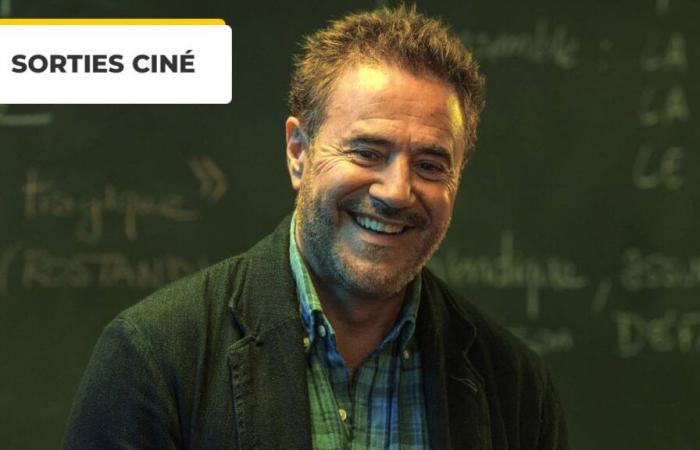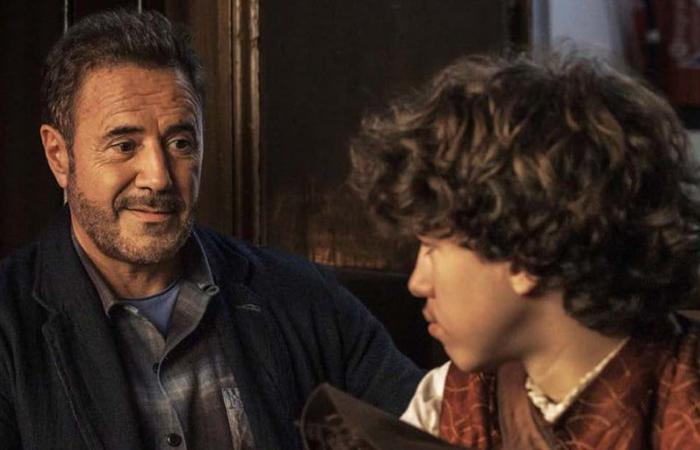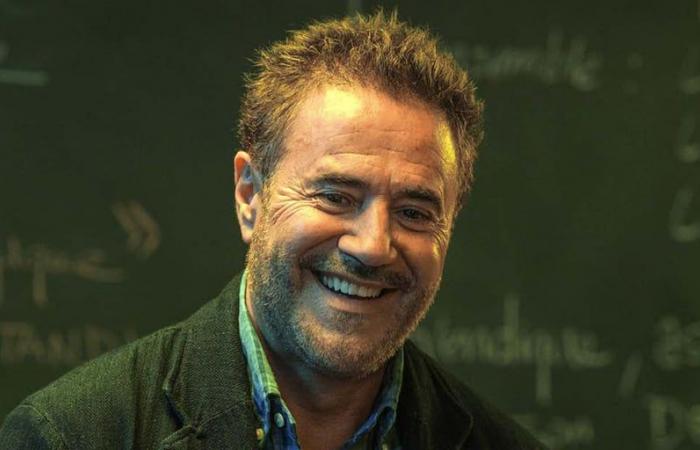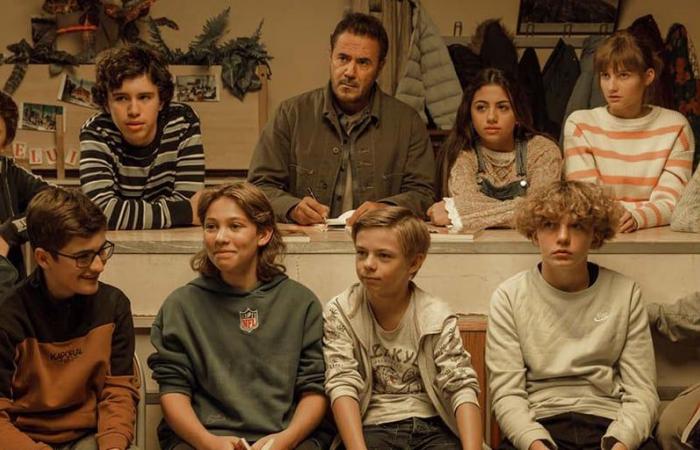“Le Panache” hits theaters this Wednesday. José Garcia plays a theater teacher who will allow Colin, a stuttering teenager, to gain self-confidence.
A year and a half after Sage-Homme, Jennifer Devoldère returns with Le Panache, a film adapted from the one-on-one by Nicolas Devort, “In Cyrano's shoes“.
Led by José Garcia, Aure Atika and the young Joachim Arseguel, the film follows Colin, a 14-year-old schoolboy, who enters a new school. But how do you cope when, like him, you are a stutterer? His meeting with Monsieur Devarseau (Garcia), a charismatic French teacher, will push him to face his fears and break out of his isolation. Now Colin has a group of friends and a project: to go on stage to play Cyrano in front of the whole school.
A young actor who stutters
This is the young man's first film role. Joachim Arseguel. The director explains in the press kit: “From the start, we wanted the character to be played by a PQB (person who stutters) and not by an actor who would “play” stuttering. We launched a wild casting call and we fell in love with Joachim.
It was his speech therapist who pushed him to audition. He worked very hard and like Colin, he opened up to the world, he gained self-confidence and gained autonomy. We were inspired by his story and we integrated “his way” of stuttering.”
SND Joachim Arseguel
Just like his character in the film, the young actor discovered theater and the experience was beneficial to him, as he explains: “At the beginning of the story, Colin gave up, while I never gave up. I had the impression of being ahead of him, but at the same time understanding him intimately, because what he suffered, the harassment, the mockery, the start of a new school while we has a disability, the apprehension, the first time we start talking, the reaction of others, in short, all of that, I experienced it and experienced it very badly too.
I experienced all this and experienced it very badly too.
I also felt like Colin's journey and my own experience on the film were intertwined. Like Colin with the theater, acting in the film opened me up, blossomed me. I came away changed – it gave me self-confidence. For the first time in my life, stuttering brought me things, became a strength, an asset, and I understood that it was, in a certain way, part of my identity. Today, I cope very well with my stuttering.”
Fiction mixed with reality here, and the work with the other actors and in particular José Garcia helped Joachim Arseguel a lot. to be comfortable:“José never looked at me as a young beginner or someone with a disability. He looked at me as his equal, as a playing partner and that immediately put me at ease. “
A reference to the Circle of Dead Poets
In The PanacheJosé Garcia plays a passionate theater teacher, a character reminiscent of Professor John Keating played by Robin Williams in The Circle of Dead Poets. The director also declares in the press kit: “The reference is both completely assumed and heavy to bear. David Devarseau's finale is a direct homage to Peter Weir's film. Like Keating, Devarseau reveals young people to themselves and awakens their conscience. It will mark it forever their lives, but I think the comparison stops there.“
SND
Met to promote the film, José Garcia explains to us that he tried to distance himself as much as possible from the film with Robin Williams.
“It was really my obsession. There is a scene that resembles the finale of The Circle of Disappeared Poets, and it’s really a slightly delicate moment in the film because I really didn’t want us to end up in that. I think that Devarseau is above all a guy who is much more in the look, in the observation, in the listening. He does not want to impose or give keys so that the students get carried away, disperse and go out a little. of their Rather, it gives them the opportunity to dream, to set their own limits wherever they want. And that's another approach.
Keating's character wants to shake up the kids so that they live, so that they think differently, so that they move. But my character looks at the kids, he observes them, and based on that, he very tenderly leads them to discover themselves for themselves. He explains to them that the only limits are those they impose on themselves, but that from the moment they are removed, everything is possible. And that on a theater stage, they can live that life.”
Theater is indeed liberating and allows students to come to terms with who they are and to make their own decision. Joachim will disobey his mother – who tries to protect him – while Tom will go against his father and come to terms with his sexuality.

SND
Taking teenagers seriously
Off camera, the French actor tried not to play the role of the teacher so as not to create an overly studious climate. He confesses to us: “I'm the worst dunce in the whole class. I put myself in a corner, I let the kids come one after the other and they understood that I was even stupider than them.
We filmed for 35 days, in the middle of summer, in a classroom. We must not forget that this is their daily life all year round. So I was trying to come up with stupid things to say at the end of each take, because I wanted them to keep their attention. And then I was accepted by them as part of the group. That's what I like the most. Not showing up, starting to say, “You know, little one,” starting to make sugar daddy, that’s not a good thing at all.
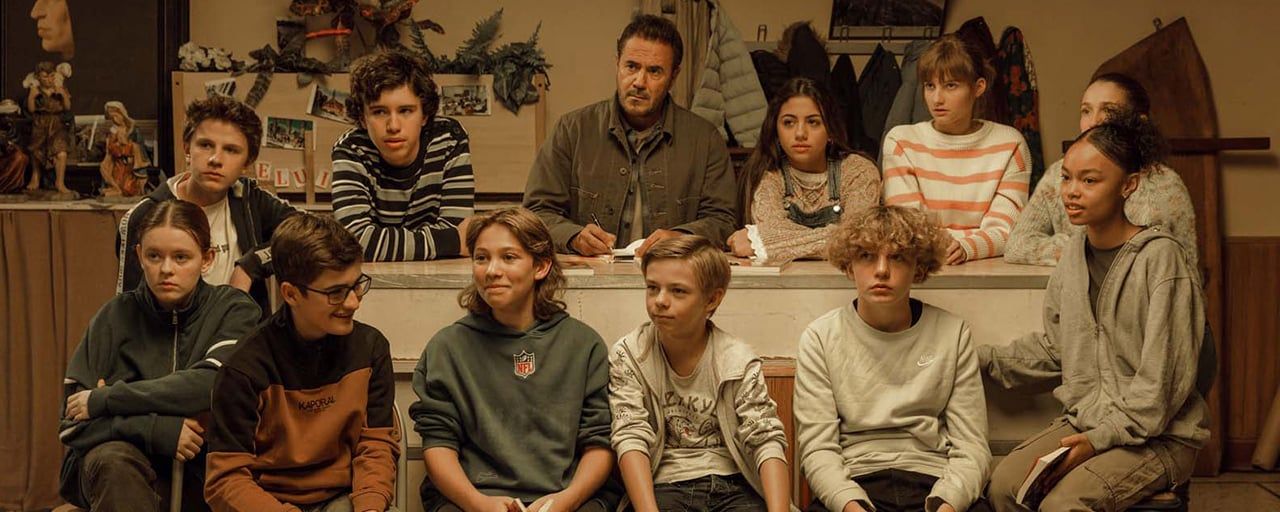
SND
And then I think it's very reassuring for teenagers to find themselves at some point with other teenagers as intelligent as them, to be able to live together and also to be with adults who don't take them seriously. for idiots.
When you're a teenager, there's nothing worse than not being respected
The problem today is that everyone thinks everyone else is stupid. And actually, when you're a teenager, there's nothing worse than not being respected. We're looking for ourselves, we're looking for things and someone says to you: 'No, you need to stop looking, try to get back on the right path.' And you actually say, 'No, leave me. It's still a time when I have the right to search.'
It's also a complicated time for adults, because we absolutely want to get the kids back on the right path. But then, when you have a midlife crisis, no one does that anymore.”
Acceptance of self and others
The Panache addresses several themes including acceptance of oneself and others, addressing subjects such as stuttering and sexual diversity. For José Garcia, the message is clear: you must live your life without worrying about the judgment of others.

SND
José Garcia tells us :”The moment of adolescence is the moment when you want to be accepted. You are so awkward that you don't know, you are not yet completely defined. So, you have difficulty in yourself to be accepted. In the case of Joaquim, who plays Colin, he arrives, he is shy and suddenly, he falls in love with a girl and then, there is a handsome guy in the class and he says to himself: that it's going to be difficult.
Her friend Tom wants to live his sexuality the way he wants but his father absolutely doesn't want to hear about it. This is truly a film about acceptance. And Joaquim made this very noticeable during filming. There was so much goodwill that finally he said to himself: “How come there can be so much goodwill here and so many idiots laughing at me in other places?”
I think that from the moment you explained that you were a stutterer, there are two solutions: either you can continue laughing like an idiot, or you can listen to it and try to compose something and completely accept this difference .
There are people who fight for their rights, there are others who fight so that others don't have them!
A while ago, what's the problem? Whether you are in a mutation, whether you are transgender, whether you are queer, whether you are whatever you want. What's the problem? What's the problem with people living what they want to experience? There are people who fight for their rights, there are others who fight so that others do not have them. And these are the people we must fight. And this film is here precisely to explain that damn it, we have the right to live, it's your life. No one is going to live in your place.”
A caring film about adolescence and self-acceptance to see this Wednesday at the cinema.

